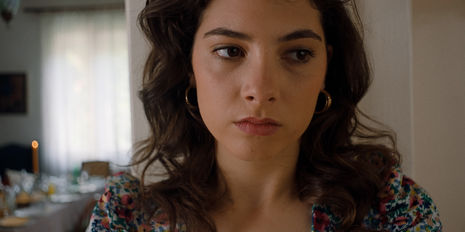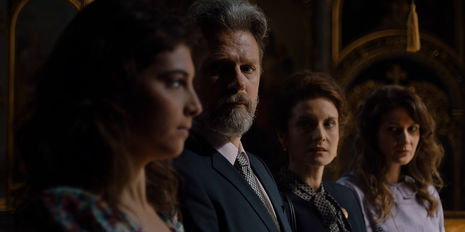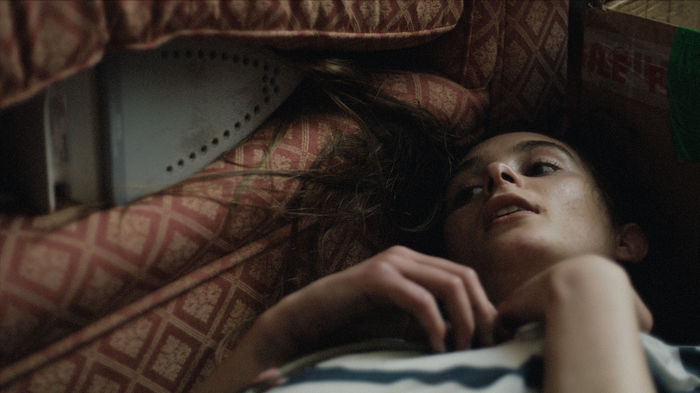Mimi Vlaovic and films ‘about love, not war’
Olivia Townsend discusses the intricacies of approaching stories about conflict with up-and-coming filmmaker Mimi Vlaovic

There’s two types of movies that seem to have been around since the dawn of the camera: ‘great man biopic’ and the all-encompassing (and typically three-hour long) historical saga. Both are very much alive and kicking in cinema today. As a History student I can’t say I don’t enjoy such films, but I can equally tell you that I crave more narratives which tell personal histories from the ground up. Period cinema does not always need to be overtly political and to span a period of time or a person’s life – there is a place for the Oppenheimer’s and All Quiet on the Western Front’s, but there must also be projects about love, optimism and the slices of past lives which otherwise go unseen. When I got the chance to preview the short film Your Guardian by director Mimi Vlaovic, this craving for a personal period piece was very much satisfied.
“I love happy endings and I’m very much fighting for them”
“It is inspired by my parents and their experiences in 1992 Yugoslavia,” Mimi tells me – Your Guardian is Mimi’s project for her graduation from the London Film School and it follows a woman in a similar circumstance to her own, Mina. She is a young woman living in Belgrade, freshly graduated and facing the chance to move away with her boyfriend to escape conflict as Yugoslavia falls. It tells a story which challenges these big narrative trends in period dramas by placing a highly personal narrative at the centre of a seismic political event – yet this was not Mimi’s original intention. After a long-time love affair with the work of Richard Curtis she “was expecting a rom-com country” when she came to England, only to have her proposals for making her own rom-com turned down by her LFS teachers three times. “You’re from Serbia, why don’t you write about the war?” was their response, and she says Serbian dramatic academies have the same ideas, as they value the “heaviest possible subjects”. She asserts that “I didn’t want to write about the war, I wanted to write about love.” Your Guardian walks the line between these perfectly.

Born and raised in Belgrade, the story is rooted in Mimi’s own experiences and heritage, and to some extent, art imitates life; Mimi’s own move to London to pursue her filmmaking MA was a big step in her life, and a decision not too dissimilar to Mina’s. Your Guardian is steeped in personal history; there was a “feeling of claustrophobia within my own home and my own family,” Mimi says. Her decision to move here was “expected to be a family decision,” but she came to England totally alone. Similarly, the film’s protagonist Mina is caught out by her father when he realises her plans to leave Belgrade with Igor, her boyfriend. Mimi’s curation of a family home in Your Guardian is decidedly overbearing and restrictive as Mina longs to leave, and while the film ends with her father letting her go, this atmosphere provides an important backbone to the short film.
“I didn’t want to write about the war, I wanted to write about love”
Your Guardian was aided by the small Serbian network of family friends and contacts Mimi was able to develop in London. Speaking to her landlord, who moved to the UK from Serbia in the 1990s, and friends of her parents who also made the move, she was able to piece together a powerful sense of place and history from “distant connections”. Entwined together, they mould the coming-of-age short into a project that is essentially an intimate micro-history – it has a charged political context at its core which is approached through an intimate personal narrative.
When it comes to the process of entering the professional industry, starting out as a filmmaker is far from plain sailing. Making her grad film during COVID was naturally a tumultuous experience – she was the only crew member involved in the project from start to finish, and was working with an established Serbian film crew. Mimi tells me that there is a lot of “big arthouse snobbery,” and during her studies there were periods in which she felt that her exploration of lighter genres like comedy were not supported. “I love happy endings and I’m very much fighting for them,” she explains enthusiastically. The prevailing message throughout Your Guardian and its production was simply that: “everyday life is sad enough and we need to see the glimpse of hope sometimes.”
Mimi’s career started out with writing novels, many of which are romantic and light-hearted, and so the jump to the creation of Your Guardian naturally brought its own challenges. “Writing this wasn’t fun,” she tells me. It’s not very often a filmmaker openly discusses the fact that they didn’t enjoy a part of the creative process, and Mimi’s transparency clearly frames her dedication to this project. Despite this challenge, Mimi is incredibly excited as she recalls the numerous festivals the film has been accepted to already, and hints at her hopes to develop it into a feature eventually. It was “an emotional rollercoaster,” says Mimi, but it’s clearly a ride which is only just beginning to climb towards an exciting career in filmmaking.
 News / Report suggests Cambridge the hardest place to get a first in the country23 January 2026
News / Report suggests Cambridge the hardest place to get a first in the country23 January 2026 Arts / Exploring Cambridge’s modernist architecture20 January 2026
Arts / Exploring Cambridge’s modernist architecture20 January 2026 Comment / The (Dys)functions of student politics at Cambridge19 January 2026
Comment / The (Dys)functions of student politics at Cambridge19 January 2026 Theatre / The ETG’s Comedy of Errors is flawless21 January 2026
Theatre / The ETG’s Comedy of Errors is flawless21 January 2026 News / Write for Varsity this Lent16 January 2026
News / Write for Varsity this Lent16 January 2026










